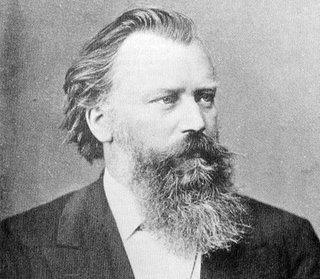
Besides music itself, there is no better way than food to celebrate Brahms’ 173rd birthday. David Torrey, who decorated his dinning room with Brahms theme, hosted the party for Pittsburgh Frontrunner.
Actually, it was also the birthday (May 7th) of Tchaikovsky. Unfortunately, there are no members who know Russian Cuisine in the running group. On the other hand, Brahms and Tchaikovsky cannot reconcile in music. To Brahms, Tchaikovsky is too sentimental and shallow while to Tchaikovsky, Brahms is too derivative. For Pittsburgh Frontrunners, who to celebrate seems less important than what to eat. Considering Pennsylvania has the largest German descendants in the states, what food to choose or who to honor can be answered easily.
Based on portraits of him, Brahms should be no runner. Luckily, more than 150 years ago, food industry was not plagued by calorie-bombed fry-prone fast food trend. It turned out the food he enjoyed mostly is quite simple and delicious.
A son of a poor family in the poor neighborhood from North Germany, Brahms was humble and never extravagant on food. However, His love of food was well recorded in many biographies and anecdotes. Once he was gravely disappointed when he contracted an illness for which his doctor prescribed a strict diet. "But this evening I am dining with Strauss and we shall have chicken paprika," the composer protested. "Out of the question," the doctor ruled. "Very well, then," Brahms replied. "Please imagine that I did not come to consult you until tomorrow.”
According to Jan Swaffod’s book “Johannes Brahms: A Biography”, after he moved to Vienna after 1862 where he spent the rest of his life, He lived simply in modest lodgings and enjoyed his food by mostly dinning out. One of his favorite restaurants in Vienna is The Red Hedgehod. The menu, which also served me in the party, includes:
Hungarian goulash
Pumpernickel bread
Tokay
Bavarian Tort
(And of course) German Beer
Other runners also brought some dishes like dissert, salad and sauerkraut. Although the latter food sauerkraut is served in most German restaurants, it is said that sauerkraut actually dates back to c200 B.C. China where the workers building the Great Wall of China ate it as a supplement to their normal diet which consisted mainly of rice. Admittedly, it was made with wine at that time, but nevertheless, it was the origin of today's recipe. Whether Brahms liked it or not is unknown, but one thing for sure, I cannot enjoy it no matter whatever healthy recipe it has. (My dad once frowned his face and commented when eating sauerkraut:” In Germany, vinegar must be free!”)
Dave, who read through Jan’s 700-page biography book of Brahms, found the menu information above and made the main course goulash. The paprika he chose does not have chili in it therefore the taste of goulash is as mild as Brahms. With Brahms’ Hungarian Dances in the air, I promptly finished two dishes of goulash and left no space for any dissert. 
To me, Jan’s book is definitely for very serious readers, same as Solomon’s biography of Beethoven. Recently, I begin to read a Beethoven biography written by Edmund Morris, the Pulitzer Prize winner for his book “The Rise of Theodore Roosevelt”. Although his book of Teddy Roosevelt is lengthy and detailed so that I haven’t gone through the first few chapters, his book of Beethoven is enticing even for laymen like me. (There are less than 250 pages.) Edmund is non-analytical in music but pedantic for events. His writing style forces him to take a stance from the very beginning even though he keeps an objective tone in narrating Beethoven’s life. He has the capability to weave all those facts together to support his subjective statements so that all the judgments sound natural and unobtrusive unless you are hostile to Beethoven or to the author.
Here is an excerpt that I enjoy. It is about how Beethoven reacted to his deafness.
A distinguishing characteristic of the creative mind is that it can accept reversals of fortune without emotional damage—indeed, process them at once into something rich and strange. Ordinary psyches often react to bad news with a momentary thrill, seeing the world, for once, in jagged clarity, as if lightning has just struck. But then darkness and dysfunction rush in. A mind such as Beethoven’s remains illumined, or sees in the darkness shapes it never saw before, which inspire rather than terrify. This “altered state” (raptus, he would say) makes art of the shapes, while holding in counterpoise “such dualities as intellect and intuition, the conscious and the unconscious, mental health and mental disorder, the conventional and the unconventional, complexity and simplicity.

No comments:
Post a Comment